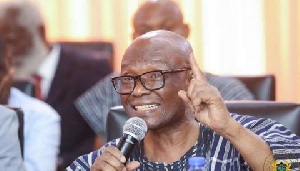Chairman of the Convention People’s Party (CPP), Professor Edmund Delle, has said the contribution of the late Dr. Kwame Nkrumah towards the industrialisation of the country cannot be forgotten. The chairman of the party said the late Nkrumah understood the importance of industrialisation hence his resolve in establishing factories across the various regions in Ghana.
Professor Delle, speaking to Nyankonton Mu Nsem on Rainbow Radio 87.5Fm indicated that, the late Nkrumah is a global icon who is revered for his immense contribution towards the development of Ghana and Africa. He said, although Nkrumah believed in forward ever, backwards never, it appears Ghana is moving backwards instead of moving forward.
‘’You don’t know where we are going and that is very sad. Nkrumah had a plan for Ghana; he started with his five-year development plan,’’ he said. Politicians today are only fighting to take power and after taking power, they do the little.
The CPP was very focused, we knew what we wanted and had timelines,’’ he added. Professor Delle lamented the filth that has engulfed the capital; and parts of the country and stressed the country is stagnating despite the plans of Nkrumah to make Ghana the number one in Africa through his unity of purpose.
He was speaking in commemoration of Founder’s Day that is celebrated on September 21, 2018. He touched on youth unemployment, corruption and the lack of inclusive governance towards the development of Ghana.
This holiday commemorates the birthday of Ghana’s main independence leader, first prime minister, and first president, Osagyefo Kwame Nkrumah. The holiday is also known as Kwame Nkrumah Memorial Day.
Born on September 21, 1909, at Nkroful in the Western Region of the then Gold Coast as Francis Nwia-Kofi, but later changed his name to Kwame Nkrumah. Nkrumah attended the Achimota School and later trained as a teacher. He studied in the United States between 1935 and 1939 to obtain a Bachelor of Art degree from Lincoln University.
He also earned a Bachelor of Sacred Theology in 1942; a Master of Science in Education and a Master of Arts in Philosophy respectively, both from the University of Pennsylvania in 1943. During his lifetime, Nkrumah was awarded honorary doctorates by some institutions including Lincoln University, Moscow State University, Cairo University, and a few more. When Nkrumah arrived in London to study Law and complete his thesis for a Doctorate degree in 1945, he met the famous African-American author, George Padmore.
Unfortunately, he abandoned his education when he was invited to serve as the General Secretary to the United Gold Coast Convention (UGCC) in 1947. As a result, Dr. Kwame Nkrumah joined five founding members of the UGCC to form the Big Six of Gold Coast.
The Big Six were the executive members of the first leading political party under the British colony. The famous Big Six were, Ebenezer Ako-Adjei, Edward Akuffo-Addo, Dr. Joseph Boakye Danquah, Emmanuel Obetsebi-Lamptey, Dr. Kwame Nkrumah, and William Ofori Atta. Dr. Nkrumah broke away from the UGCC in 1949 to form the Convention People’s Party (CPP).
In 1956, the CPP won the elections leading to independence which saw Kwame Nkrumah into office as the first Prime Minister and later President of Ghana. The achievements of Dr. Kwame Nkrumah distinguished him among his contemporaries. His ideology for pan-Africanism, Africa liberation, and self-governance earned him an enviable reputation on the globe.
As an international icon of freedom in Africa, Kwame Nkrumah was the first black leader to succeed in championing the cause for independence from the British colony in 1957. Following his stupendous legacy, Nkrumah was adjudged Africa’s greatest “Man of the Millennium” in the year 2000. His social policies and style of leadership were impeccable.
Ideally, the significance of Founder’s Day is to acknowledge our founders, including the Big Six for their stewardship as statesmen and founding-fathers of early Ghana. It is, however, important to celebrate the effort and sacrifice of our founding leaders because “A nation that does not honour its heroes is not worth dying for”.
Unsurprisingly, during the African Union (AU) 13th Ordinary Summit in Libya, the heads of State unanimously agreed to celebrate Nkrumah’s centenary birthday. The event has been added to the AU’s calendar of Special Events. Today, Kwame Nkrumah who was once vilified by his own people following the 1966 coup de’tat is now celebrated for his exemplary leadership in Africa.
He is fondly remembered for the improved roads, schools, hospitals, factories, the Akosombo Dam, the Tema Harbour and the economic stability, just to mention a few. Following the overthrow of his government on February 24, 1966, Dr. Nkrumah left for Conakry. He was appointed Co-President of Guinea until his death on 27th April, 1972. He died at the age of 63.
Dr. Kwame Nkrumah demonstrated patriotism and eschewed parochialism as a visionary leader; hence, the need to honour him on the occasion of his birthday.
As we celebrate the 106th birthday of Osagyefo, it important for every citizen of this country to exhibit a sense of patriotism and unity in all spheres of life. Let’s draw inspiration from the achievements, ideology, and vision of Kwame Nkrumah for the purpose of nation building.
Click to view details



General News of Friday, 21 September 2018
Source: rainbowradioonline.com
Ghana is stagnating, moving backwards despite Nkrumah's vision - CPP
Opinions
















